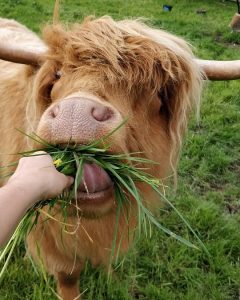Miniature Highland cows are a small but hardy breed, requiring suitable housing and space to thrive. Here are some guidelines for providing the right environment for your miniature Highland cow
know for their distinctive horns and shaggy coats. Here’s comprehensive guide to caring for a miniature highland cow:
1. Food and Water
Your cow needs clean, fresh water every day. They eat grass, hay, and sometimes cow feed. In winter, when grass is low, hay is very important. Always make sure they have enough to eat.
2. Shelter
Mini Highland cows can handle cold weather well, but they still need a dry, safe place to rest. A simple barn or shed helps protect them from wind, rain, and snow.
3. Grooming
These cows have long, thick hair. Brush them often to stop tangles and keep their coat clean. Grooming also helps you bond with your cow and check for any cuts or bugs.
4. Hoof Care
Clean their hooves to keep them healthy. A hoof pick helps remove dirt or stones. This stops pain and problems later.
5. Health Checkups
Your cow should see a vet for vaccines and checkups. This helps prevent illness. Watch for signs of sickness like coughing, limping, or not eating.
6. Time and Love
Mini Highland cows are gentle and smart. Spend time with them so they trust you. They enjoy treats, brushing, and calm voices.
What is Diet and Nutrition?
Diet is the drink a person consumes, while nutrition is the process of using food for growth, metabolism, and tissue repair. Diet and nutrition are related to health in a two-way relationship, where poor diet can have negative long-term effects, and nutrient deficiency can affect health status.
-
Main diet: Fresh pasture grass and quality hay
-
Seasonal changes: More hay in winter
-
Water: Clean and unlimited
-
Supplements: Salt/mineral blocks or loose minerals
-
Treats: Apples, carrots (in moderation)
-
Avoid: Moldy hay, processed foods, too many grains
Grain supplements: Offer limited amounts of grain (oats or corn) as needed, depending on age, size, and activity level.
Fresh water: Ensure access to clean, fresh water at all times.
Mineral supplements: Provide a mineral block or loose minerals specifically formulated for cattle.

What type of fencing for cows?
A classic option that’s effective at securing livestock. It’s made of woven wire with sharp barbs inserted, and animals stay away from it because they associate it with pain. Barbed wire may be suitable for smaller animals, but it’s not recommended for larger livestock.
Safe and secure enclosure: Build a sturdy fence (at least 4 feet tall) to prevent escape and predator entry.
Shelter: Provide a clean, dry shelter with adequate ventilation and protection from wind, rain, and sun.
Pasture management: Rotate pastures to maintain grass quality, prevent overgrazing, and reduce parasite risk.
Dairy Cattle Health and Care:
Regular veterinary check-ups: Schedule annual vaccinations and dental care.
Parasite control: Monitor for internal parasites (e.g., worms) and external parasites (e.g., ticks, lice).
Hoof care: Trim hooves every 6-8 weeks to prevent laminitis and hoof abscesses.
Dental care: Check teeth regularly for signs of wear or misalignment.
Gentle handling: Approach and handle your miniature Highland cow calmly and gently.
Training: Train your cow to respond to basic commands (come, stop, walk).
Socialization: Socialize your cow with other animals and people to promote a calm temperament.
Additional Tips :
1. Monitor weather conditions: Provide extra care during extreme weather conditions (e.g., heatwaves, cold snaps).
2. Keep records: Maintain accurate records of vaccinations, dental care, and hoof trimming.
3. Join a breed association: Connect with other miniature Highland cow owners and breeders for guidance and support.
By following these guidelines, you’ll be well on your way to providing a happy, healthy life for your miniature Highland cow. By providing suitable housing and space, you’ll be able to keep your miniature Highland cow happy, healthy, and thriving.
What makes Miniature Highland Cows special?
Miniature Highland Cows are small, friendly cows with long, thick coats. They come from Scotland and are very hardy, meaning they can live comfortably in cold weather. They are gentle, social animals that make great pets or farm friends.
How much space does a Miniature Highland Cow need?
They need about half to one acre of land each to roam and graze. They like to move around and eat fresh grass, so having enough space is important for their health and happiness.
What kind of shelter do Miniature Highland Cows require?
They need a clean, dry shelter like a small barn or a three-sided shed. This protects them from rain, wind, snow, and hot sun. Their thick coat helps in cold weather, but shelter keeps them comfortable year-round.
How often should I groom my Miniature Highland Cow?
Brush your cow once or twice a week to keep their long coat clean and free of mats. Grooming also helps you check for bugs, cuts, or other skin problems.
What should I feed a Miniature Highland Cow?
Their diet mainly includes fresh grass in the warmer months and good-quality hay in winter. Always provide clean water and offer a salt or mineral block for extra nutrients. You can give treats like carrots or apples occasionally.
How do I care for their hooves?
Check their hooves regularly and clean out any dirt or stones with a hoof pick. They will need professional trimming every 6 to 12 months to stay healthy and avoid pain or infections
